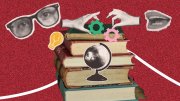When I was a freshman at Harvard, I took Humanities 10, the famed great books course for first-year students. It aimed to introduce its students to the Western canon—but it also wished to dazzle us into studying the humanities. In part, the course did this by creating an experience of pure Ivy League idyll: the six professors were senior faculty, their presentations were grand and theatrical, and some of them taught section on the top floor of the Fogg Museum. Many of the professors also embedded an argument for the humanities into the lectures themselves. Their thesis amounted to something like this: Great art transcends its context. Art rises above identity and politics. I remember the last slide of the introductory lecture, spelling out the claim in large white letters: “ART TRIUMPHS OVER DEATH.”
At the time, I believed in this message wholeheartedly. Literature had long made me feel like I was part of something bigger than myself. Humanities 10 mapped a traceable intellectual heritage onto that nameless, spiritual feeling. According to the syllabus, Homer spoke to Dante who spoke to Joyce who spoke to me, awestruck at the back of the auditorium, copying down the professors’ words verbatim.
I took the class because I wanted to grapple with the heady, universal themes of great literature. But, to my embarrassment, I could not stop talking or writing about women. I was fixated on the wives and whores of the Western canon; I wrote thousands of words about women with no spoken dialogue. My passions felt one-note and frivolous, and I worried about how they reflected on my intelligence and potential. Was I letting my identity define my interests? Was I sequestering myself inside an intellectual ghetto? When I read the classics, was I incapable of seeing past my own petty teen girl problems? I went searching for the universal, but again and again, I found myself stuck on the specificities of sexual politics.
I met Durba Mitra, Harvard’s first full-time faculty member in the studies of women, gender, and sexuality, during my freshman year, at a club event organized by my best friend. The event was a small-group Q&A in the Leverett Library Theater. I remember Professor Mitra’s distinct combination of a maroon pantsuit, combat boots, and chandbali earrings; I remember that she was brilliant and articulate in a way I aspired to be. My best friend and I were minorly obsessed with her. Two years later, after she came back from academic leave, I enrolled in her seminar on feminism in the imperial age.
In class, Professor Mitra often said that power is knowledge—an inversion of the aphorism “knowledge is power.” In an interview for this column, I asked her to elaborate on the phrase, and she told me that it speaks to several questions: Who has the right and ability to create knowledge about people, places, and the world that we live in? What does it mean when people who lived in formerly colonized societies—who are the majority of the world’s population—begin to create knowledge about themselves? What access to power does that knowledge creation grant them?
According to Mitra, the field of women, gender, and sexuality studies was born out of a question: who has the access to produce knowledge? The field was a product of the second-wave feminist movement in the late 1960s and 1970s. Through consciousness raising and public advocacy, the movement made it possible for women to take their experiences seriously as subjects of study. “The idea is, in some ways, that minoritized people take over the means of production—except it’s the means of knowledge production,” Mitra said.
Her seminar exemplified the theory of power-as-knowledge by focusing on the writings of Third World women. In the class, I studied oral histories of women who had survived the Partition of India; read feminist manifestos from China, Japan, and Bengal; and parsed through archival materials from the United Nations’ world conferences on women. These were sources that had been written by people who had historically been locked out of power. The fact that I could study them—and at Harvard, no less—was a result of the slow and seismic process of decolonization.
The framework of power-as-knowledge cast a new light on the canon-driven courses that I had taken during the first two years of college. It didn’t diminish the value of the literature and theory that I’d read, but it made me question the oft-discussed universality of those texts. Why did I place a premium on studying men’s writing? And why did I think my interest in women’s writing was inherently limited? Are men’s experiences somehow more universal than women’s? Who gets to make universal art in the first place?
I know I am not the first person to point out the ways in which the canon is political. Lately, it’s also become apparent that the canon is politicized. Last year, the Heritage Foundation—the right-wing think tank that developed Project 2025—published a 53-page report on the classical education model, which places importance on the great books of the Western canon. According to the report, studying the great books “prepares students for the timeless pursuit of the transcendentals—truth, goodness, and beauty.”
That line reminds me of the awe I felt taking Humanities 10 as a first-year student. It also reminds me of something the literary critic Terry Eagleton once wrote about conservatism. “Conservatives do not regard their beliefs as political,” he wrote. “[Politics] is what other people rattle on about, whereas one’s own commitments are a matter of custom, instinct, practicality, common sense.” In its report, the Heritage Foundation makes a point specifying whose custom the classical education curriculum honors. By teaching the great books, classical education programs “resurrect not just a Western intellectual tradition, but a distinctly American one, reading the same classics that inspired many of the Founders.”
Here, a chink in the classical education model’s claim to transcendence: it venerates these books, not in spite of, but because of their authors’ identities. The framework of power-as-knowledge applies to great books as much as it applies to gender studies.
My favorite reading from Professor Mitra’s seminar was Fantasia: An Algerian Cavalcade, a novel by the Algerian writer Assia Djebar. In the opening chapter, the narrator describes a young girl in an Algerian village attending school for the first time. It is unusual for someone like her to receive formal schooling, and the neighbors do not approve. Once the young girl becomes literate, they fear that nothing will be able to silence her.
To fully appreciate the opening sequence, it might be helpful to know something about the particular religious and political influences on rural villages in colonial Algeria. Indeed, Djebar’s novel is rooted in Algerian history: her chapters alternate scenes from the girl’s life with episodes in Algeria’s fight against French colonialism. In these first few pages, the little girl’s story is about learning to read and write in a society that bars women from literature and public life. But it is also a story about her ability to determine her own fate. “The written word will take flight from the patio, will be tossed from a terrace,” Djebar writes. “The blue of heaven is suddenly limitless.” That, too, feels universal.









